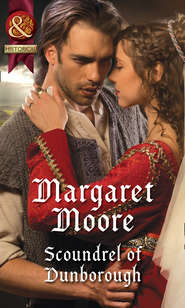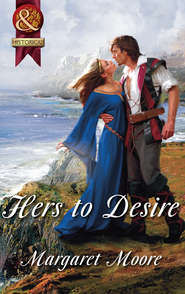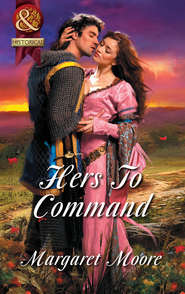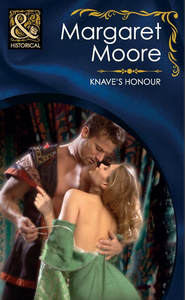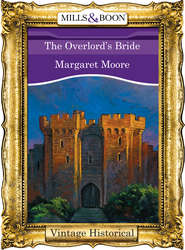По всем вопросам обращайтесь на: info@litportal.ru
(©) 2003-2024.
✖
A Warrior's Honor
Настройки чтения
Размер шрифта
Высота строк
Поля
Chapter Three
Rhiannon stared at her father as he turned a searching gaze onto her before once again looking at their host.
Lord Melevoir cleared his throat. “Lord Cynvelin ap Hywell. A Welsh nobleman,” he concluded rather hopefully.
“A Welshman born he may be,” the baron said, “but he is a disgrace to us all.”
Rhiannon had never seen her father react with such instant antipathy—and she had not even known that her father was familiar with the man! What on earth had Cynvelin ap Hywell done to so enrage her father?
He regarded her with that same forbidding expression. “Did he speak to you?” he demanded.
She nodded.
“Did he know who you were?”
“Yes,” she answered softly. “Cynvelin ap Hywell said that he knew of you when he introduced himself, but he never implied, either in word or look, that there was anything between you. He was very nice to me, although rather forward.”
“I daresay he was,” the baron growled. “Not waiting for Lord Melevoir to make the introduction, you?”
She shook her head remorsefully, for he was quite right. It would have been proper for Lord Melevoir to make the introduction, and she should have realized that at the time.
“Baron, if I had known there was anything—” Lord Melevoir said haltingly.
Rhiannon’s father took a deep breath. “Forgive me, Lord Melevoir. None of this is your fault. Or yours, either, daughter.” He looked at Rhiannon ruefully. “I should have guessed he might be here and I should have warned you about him.”
He stared straight ahead and she wasn’t sure if he was speaking to her, or only to himself. “But never did I think he would have the gall to speak to any member of my family.”
Despite his hushed voice, Rhiannon got the distinct feeling that her father was still trying very hard to control his rage.
“What has he done to make you hate him so?” she asked wonderingly.
“Indeed, yes,” Lord Melevoir seconded. “If he is such a blackguard, I will not have him back again.”
“He was a blackguard. If Bryce Frechette can be so changed, perhaps Cynvelin can, as well.” The baron smiled, but not with his eyes, which made Rhiannon believe he was saying this only to reassure their host that he had not made a terrible blunder. “He had the makings of a fine knight when I first admitted him into our household.”
“He was at Craig Fawr?” Rhiannon asked, taken aback. “I don’t remember him.”
“You were visiting Lord Trevelyan at the time and, not wanting to admit I had made a mistake, I never mentioned his name after I sent him away.”
“What made you do that?” Lord Melevoir inquired.
“First, it was only cheating at games. Then he started making trouble among all the young men, spreading lies and rumors until they were nearly at each other’s throats. Not that any blame would ever attach to him. Oh, no, he was too clever for that. I finally realized what was going on when Griffydd blackened Dylan’s eye, and I made him tell me why he had done it. When they understood what Cynvelin was about, Dylan was all for killing him on the spot.” The baron grinned wryly. “Cynvelin will never know how close he came to going to God that day. 1 thought a good talking-to would be sufficient, but I was wrong. Shortly after, somebody cut the cinch on Dylan’s horse’s saddle, so that it snapped when he was galloping during a practice with the lance. He fell and could have been killed. Of course I guessed who had done it.”
“And you sent him away,” Lord Melevoir said, nodding his head in agreement.
Her father hesitated, lost in his thoughts, while Rhiannon waited tensely for him to continue. “Yes,” he said after a long moment of silence.
There was more to it than that, she felt certain, but ask anything more, she dared not.
Lord Melevoir sank back in his chair. “Well, by all the saints and cherubim, Baron DeLanyea. If ever there was a wolf in sheep’s clothing! Next thing you’ll be telling me he’s one of those damned rebels, too.”
“A rebel? God’s wounds, no, not that one. Although not surprised, me, if he were to claim to be when it suited him among the Welsh,” her father continued grimly. “But the only person he thinks about is himself. If he ever starts spouting rebellion, you can be sure there’ll be a prize in it for him.”
At that moment, Dylan and Griffydd marched into the hall, followed by their men.
“Do you know who Rhiannon’s been kissing?” Dylan declared angrily, glaring at Rhiannon in a way that made her more angry than mortified.
After all, however shamefully she may have conducted herself, Dylan was hardly a saint. Many a night he sneaked out of Craig Fawr for trysts with village girls. He had already fathered three children by three different women. To be sure, to the Welsh an illegitimate child was nothing to be remorseful about, but such behavior hardly gave him the right to act so indignant.
Griffydd’s expression, however, only made her feel humiliated, and she was very glad neither one of them knew about that other unforgettable kiss in the courtyard.
Nevertheless, she rose swiftly and glared at them, because they were making accusations without knowing her side of things.
As she had accused Bryce Frechette without knowing his side of things.
Which was completely immaterial at the moment.
“I don’t think—” she began angrily.
“Sit down!” her father commanded Rhiannon. “Dylan, lower your voice.”
Lord Melevoir stood slowly. “I believe I will leave you to discuss your family business in private,” he said before tottering away as fast as his legs would take him.
The baron gestured for Dylan and Griffydd to come closer. “We will deal with this once and for all, and then there will be no more said about Cynvelin ap Hywell.”
Dylan glared angrily at Rhiannon. “Do you know what they’re saying about you? That you threw yourself at that cur.”
“I never did!” Rhiannon protested, almost sick to realize that was how her behavior in the hall had been interpreted by some people. Bryce Frechette had certainly been of that opinion. No doubt that explained why he felt free to embrace her. What must he think of her now?
She suddenly wished with all her heart that she had never come here!
The baron glanced at the rest of his men who were coming into the hall, calling out for drinks from the serving wenches. “Lower your voices,” he repeated firmly.
“That is what they are saying,” Griffydd confirmed, his steady gaze far more unnerving to Rhiannon than Dylan’s words.
She flushed hotly, her stance still defiant, even though inwardly she wanted to flee from their accusations. “Who?” she demanded. “Who dares to say such things? I spoke to Cynvelin ap Hywell and danced with him, too!” she declared defensively. “I didn’t know anything wrong of him, and I think you have no right to condemn me.” Not for that.
Her father spoke, his voice calm and firm. “She did not know anything about him. I never told her.” He fastened a steely gaze onto Dylan. “You are hardly worthy to chastise her behavior.”
“But she is a woman and—”
“And I am her father, so I will speak to her about her behavior, not you, although I gather she was not pleased by what he did any more than you.”
Dylan frowned. Rhiannon knew he would sulk a while, yet she didn’t care, not as long as her father realized she deeply regretted what had happened, even if he did not know all that she regretted.
“No fights need be fought over whatever men with too little time on their hands might say, either,” her father warned. “The Normans have never understood the Welsh. They are often as gloomy as hermits in a cold cave, so I would not pay them much heed when they criticize your spritely sister.
“Dylan, Griffydd, this conversation is finished. Your sister may have acted with less decorum than I might have hoped, but even you have done so on occasion, Griffydd—and you often, Dylan. Go, now, and make certain that the men understand they are not to quarrel with Lord Melevoir’s guests or his men over any perceived insults.”






